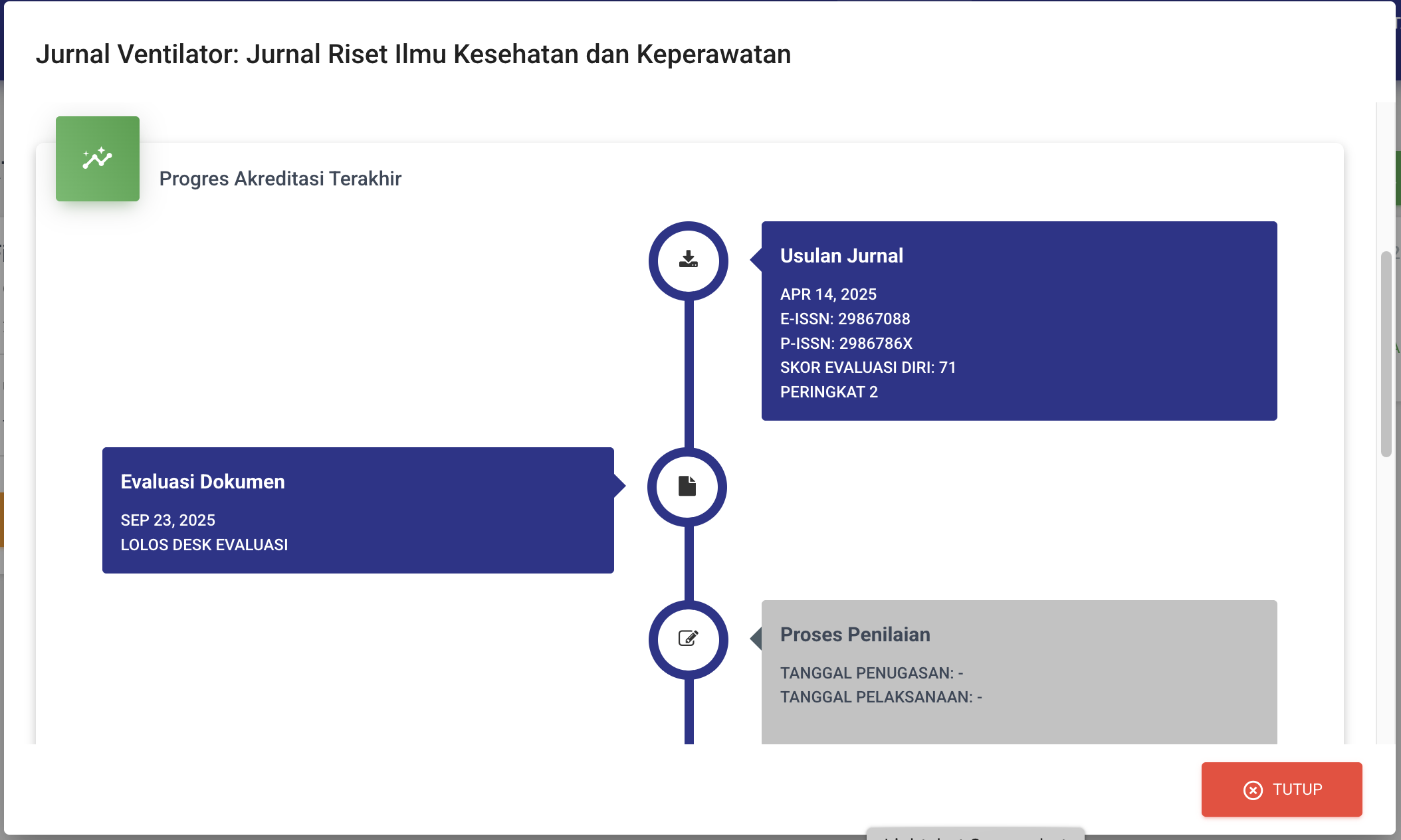Faktor-Faktor yang Berhubungan dengan Diabetes Self Care Management pada Pasien Diabetes Mellitus Tipe 2
DOI:
https://doi.org/10.59680/ventilator.v3i1.1754Keywords:
Diabetes, Family Support, Knowledge, Self Care Management, Self EfficacyAbstract
Complication rates among patients with Type 2 DM are increasing and worsening due to their inability to implement self-care management. However, this cause can be minimized if patients have good knowledge, self-efficacy, and family support. The study used a quantitative approach with a cross-sectional design. The sample consisted of 147 respondents with type 2 diabetes in Bandarharjo Community Health Center Semarang, who were selected using purposive sampling technique. The test used was chi square test. The study showed that most respondents had low knowledge (47.6%), poor self efficacy (44.2%), adequate family support (49.7%) and good self care management (46.3%). The results showed a relationship between knowledge, self efficacy and family support on self care management in Type 2 DM patients at Bandarharjo Semarang Health Center (p<?). The results showed that there is a relationship between knowledge, self efficacy and family support on self care management in patients with Type 2 DM at Bandarharjo Community Health Center Semarang.
References
Al Fatih, H., Ningrum, T. P., & Handayani, H. (2024). Hubungan literasi kesehatan dan self efficacy dengan kepatuhan diabetes self management. Jurnal Keperawatan BSI, 12(1), 34–43. https://ejurnal.ars.ac.id/index.php/keperawatan/index
Alenbalu, M., Egenasi, C. K., Steinberg, W. J., & Aluko, O. (2024). Diabetes knowledge, attitudes, and practices in adults with type 2 diabetes at primary health care clinics in Kimberley, South Africa. South African Family Practice, 66(1). https://doi.org/10.4102/safp.v66i1.5838
Amran, P., & Rahman, R. (2020). Gambaran hasil pemeriksaan HbA1C pada penderita diabetes melitus tipe II di RSUD Labuang Baji Makassar. Jurnal Media Analis Kesehatan, 9(2), 13–18. https://doi.org/10.32382/mak.v9i2.686
Bohanny, W., Wu, S.-F. V., Liu, C.-Y., Yeh, S.-H., Tsay, S.-L., & Wang, T.-J. (2021). Health literacy, self-efficacy, and self-care behaviors in patients with type 2 diabetes mellitus. Journal of the American Association of Nurse Practitioners, 25(9), 495–502. https://doi.org/10.1111/1745-7599.12017
Bulechek, G. M., & McCloskey, J. C. (2022). Nursing interventions classification (NIC). Medinfo, 8(Pt 2), 1368.
Burhan, F. Z., Susetyowati, S., & Julia, M. (2023). Obesitas sebagai faktor risiko penurunan aktivitas fisik vs. penurunan aktivitas fisik sebagai faktor risiko obesitas. Jurnal Gizi Klinik Indonesia, 20(2), 64. https://doi.org/10.22146/ijcn.86821
Delfina, S., Carolita, I., Habsah, S., & Ayatillahi, S. (2021). Analisis determinan faktor risiko kejadian diabetes mellitus tipe 2 pada usia produktif. Jurnal Kesehatan Tambusai, 2(4), 141–151. https://doi.org/10.31004/jkt.v2i4.2823
Erida Silalahi, L., Prabawati, D., & Priyo Hastono, S. (2021). Efektivitas edukasi self-care terhadap perilaku manajemen diri pada pasien diabetes melitus di wilayah Puskesmas Sukapura Jakarta. Media Publikasi Promosi Kesehatan Indonesia (MPPKI), 4(1), 15–22. https://doi.org/10.56338/mppki.v4i1.1385
Habibah, U., Ezdha, A. U. A., Harmaini, F., & Fitri, D. E. (2019). Pengaruh diabetes self management education (DSME) dengan metode audiovisual terhadap self care behavior pasien diabetes melitus. Health Care: Jurnal Kesehatan, 8(2), 23–28. https://doi.org/10.36763/healthcare.v8i2.53
Hu, J., Mion, L. C., Tan, A., Du, Y., Chang, M.-W., Miller, C., & Joseph, J. J. (2021). Perceptions of African American adults with type 2 diabetes on family support: Type, quality, and recommendations. The Science of Diabetes Self-Management and Care, 47(4), 302–311. https://doi.org/10.1177/26350106211018994
Huzaimah, N., & Filani, A. (2023). Hubungan pengetahuan dan sikap dengan perilaku self care pada penderita diabetes melitus tipe 2 selama pandemi di desa Kalianget Barat. Jurnal PIKes Penelitian Ilmu Kesehatan, 4(1), 35–46.
Ludiana, L., Sari, H. S., Hasanah, U., Fitri, N. L., & Utami, I. T. (2024). Hubungan dukungan keluarga dan lama DM dengan self care behavior penderita diabetes mellitus tipe 2. Malahayati Nursing Journal, 6(11), 4760–4768. https://doi.org/10.33024/mnj.v6i11.16805
Luthfa, I., & Fadhilah, N. (2019). Self management menentukan kualitas hidup pasien diabetes mellitus. Jurnal Endurance, 4(2), 402. https://doi.org/10.22216/jen.v4i2.4026
Manuntung, A. (2020). Efikasi diri dan perilaku perawatan diri pasien diabetes melitus tipe 2 di wilayah Puskesmas Pahandut. Adi Husada Nursing Journal, 6(1), 52. https://doi.org/10.37036/ahnj.v6i1.159
Marlinda, N. W. Y., Nuryanto, I. K., & Noriani, N. K. (2019). Hubungan dukungan keluarga dengan perawatan diri (self care activity) pada pasien diabetes melitus tipe 2. Jurnal Riset Kesehatan Nasional, 3(2), 82–86. https://doi.org/10.37294/jrkn.v3i2.182
Munir, N. W., & Solissa, M. D. (2021). Hubungan self-efficacy dengan self care pada pasien diabetes melitus. Jurnal Keperawatan Widya Gantari Indonesia, 5(1), 9. https://doi.org/10.52020/jkwgi.v5i1.1972
Nugraha, I., Badriah, S., & Rayasari, F. (2021). Faktor dominan yang berhubungan dengan self care pada diabetisi. Jurnal Penelitian Kesehatan Suara Forikes, 12(nomor khusus), 140–144. http://dx.doi.org/10.33846/sf12nk227
Prabasari, N. A. (2021). Self efficacy, self care management, dan kepatuhan pada lansia hipertensi (studi fenomenologi). Jurnal Keperawatan Malang, 6(1), 1–10. https://doi.org/10.36916/jkm.v6i1.115
Rahmadani, D. F., & Jihad, M. N. K. Al. (2023). Penerapan diabetes self management education (DSME) terhadap peningkatan manajemen kesehatan mandiri pada pasien DM tipe 2. Ners Muda, 4(1), 30. https://doi.org/10.26714/nm.v4i1.12959
Saraswati, S. K., Rahmaningrum, F. D., Pahsya, M. N. Z., Paramitha, N., Wulansari, A., Ristantya, A. R., Sinabutar, B. M., Pakpahan, V. E., & Nandini, N. (2021). Literature review: Faktor risiko penyebab obesitas. Media Kesehatan Masyarakat Indonesia, 20(1), 70–74. https://doi.org/10.14710/mkmi.20.1.70-74
Sekardiani, N. L. P., Swarjana, I. K., Satriani, N. L. A., & Megayanti, S. D. (2023). Factors influence self-care behavior and diabetic management in patients with diabetes mellitus. MEDISAINS, 21(2), 51. https://doi.org/10.30595/medisains.v21i2.18663
Sudyasih, T., & Nurdian Asnindari, L. (2021). Hubungan usia dengan selfcare pada pasien diabetes mellitus tipe 2. Intan Husada: Jurnal Ilmu Keperawatan, 9(1), 21–30. https://doi.org/10.52236/ih.v9i1.205
Sukma Wicaturatmashudi, Pradana Soewondo, Debie Dahlia, Sali Rahadi Asih, Dewi Gayatri, & Ratna Aryani. (2024). Impact of self-management on the quality of life of patient with diabetes mellitus: A systematic review. Jurnal Promkes, 12(1), 120–128. https://doi.org/10.20473/jpk.V12.I1.2024.120-128
Wayunah, W., Hidayatin, T., & Ayunda, A. (2020). Relationship of self-care management as an effort to control blood glucose levels in diabetes mellitus patients: A literature review. Jurnal Kesehatan Indra Husada, 8(2), 267–274. https://doi.org/10.36973/jkih.v8i2.270
World Health Organization (WHO). (2022). Report of the first meeting of the WHO Global Diabetes Compact Forum: Virtual meeting, 10–11 November.







